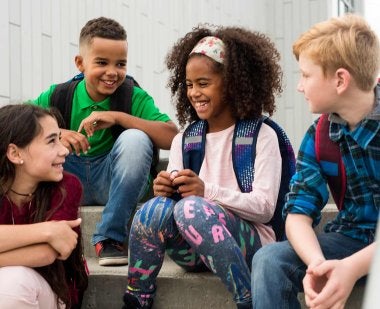
A computer game about catching escaped zoo animals is helping researchers understand why some children might have an easier time developing close friendships.
In a study recently published in Research on Child and Adolescent Psychopathology, a team including child development researchers from the University of Maryland College of Education found that children who are better able to regulate their thoughts and behaviors at an early age—suggested by when they choose to press a button in a game—show fewer emotional and behavioral problems as they enter elementary school. This leads to closer friendships and less loneliness as they get older.
“We need to understand what's happening in early childhood that makes some people more connected to others,” said Selin Zeytinoglu, a postdoctoral fellow in the College of Education, who led the study. “People who are more socially connected and feel less isolated have better physical and mental health outcomes and live longer lives.” Zeytinoglu collaborated with Nathan Fox, distinguished university professor in the College of Education, and colleagues from the University of Southern California and the University of Waterloo.
The study followed 291 young children over six years. The researchers asked 4-year-olds to play a computer game in which they helped a zookeeper round up escaped animals. The kids needed to push a button as fast as they could whenever they saw an animal—unless they saw a monkey, who they were told was helping the zookeeper. The researchers found that kids who were better at pausing their button-mashing at age 4 had better control of their emotions and behaviors at age 7 and had closer friendships and felt less lonely at age 10, based on their own and their mothers’ responses to questionnaires. Because the early elementary school years are such an important time for forming friendships and social groups, children who have difficulty controlling their anger or resolving conflicts with peers at this age may have a harder time forging and maintaining close friendships as they progress through elementary school.
Parents and teachers can provide additional support to young children who struggle with self-regulation, Zeytinoglu said. Her previous research showed that caregivers who used emotionally supportive practices like responding to children’s needs, giving positive reinforcement and encouraging kids to solve problems on their own provided a safe context for children to learn how to regulate their emotions.
“Starting early is important,” said Zeytinoglu. “Interventions can focus on enhancing these emotionally supportive behaviors in parents and caregivers early on.”



